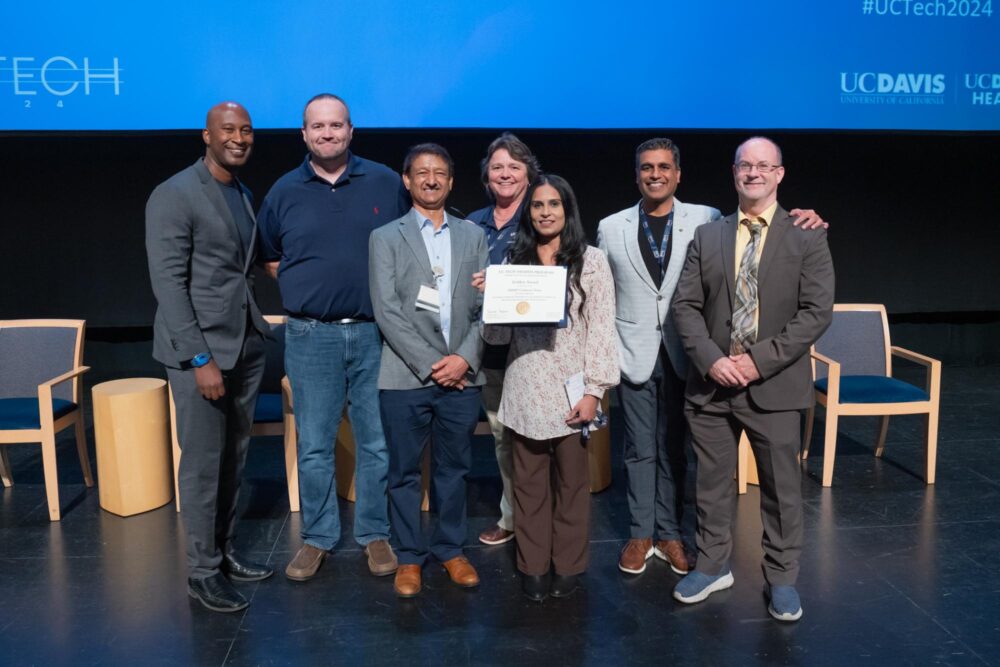The SMART Cumulus Project won Gold in UC-Wide Collaboration categories at the 2024 UC Tech Awards. This recognition celebrates UC Davis Health and its partners for pioneering a cutting-edge multi-center data-sharing system that enables faster, privacy-protected public health reporting using advanced HL7 Bulk FHIR APIs — setting a new standard for collaborative public health data integration across California.
Summary
The SMART Cumulus Project, a Multi-Center Information Technology Collaborative project, with Boston Children’s Hospital as the hub, to fast track Public Health reporting with de-identified Electronic Health Records data using the HL7 BULK FHIR Access APIs for EHRs.
Narrative
The objective of the SMART Cumulus project is to provide numerical counts of de-identified patient data from Electronic Health Records (EHRs) to inform public health officials to facilitate population and public health decisions. The SMART Cumulus project was initiated by the Office of the National Coordinator for Health Information Technology (ONC) to assess the efficiency of delivering population level data from the routine patient care EHR data, using Health Level Seven (HL7) Bulk Fast Healthcare Interoperability Resources Application Programming Interface (HL7 Bulk FHIR API) under the 21st Century Cures Act (Cures Act). This Act, signed into law on December 13, 2016, the value of which became more evident with the COVID-19 pandemic behind us. The Act facilitates innovative, advanced, and accelerated deliveries of medical products and data to concerned healthcare providers in efficient manner (21st Century Cures Act | FDA). The HL7 Bulk FHIR API was developed to provide standardized EHR data on large patient cohorts with minimal efforts while maintaining patient data privacy and confidentiality.
Five university-affiliated healthcare sites utilizing several different EHRs participated in this project by using an open-source Bulk FHIR Testing Suite developed by the Computational Health Informatics Program at Boston Children’s Hospital (BCH) and Biomedical Informatics at Harvard Medical School. Each site was tasked with extracting patient level data from their respective EHRs (Cerner, Epic, and home grown) by making Bulk FHIR API calls, synthesize that data using BCH’s SMART on FHIR Client tool behind the healthcare site’s firewall, and ultimately upload just the de-identified counts of disease specific patient cohorts to California Public Health dashboards. The UCDH team worked with the California Public Health officials to define the population health surveillance efforts that are important local population health concerns, such as opioid overdose emergency admissions, and continue to work on defining the burden of mental health illness, and uncontrolled hypertension.
Since HL7 Bulk FHIR API is still a fairly new technology, it was quite challenging for all sites to comprehend the requirements for successful data extraction from their EHRs. UCD was the first Epic site to work through those challenges and produce successful Bulk FHIR data extractions by constantly working with internal Systems Integration, Epic Population Health, Networking, and IT Security teams. Furthermore, UCD SI team resources collaborated heavily with their Epic Bridges Technical Specialist (TS) and other Epic FHIR experts to discuss the limitations of Bulk FHIR APIs, shared their experiences and guided other Epic sites on this project to assist with any similar issues they were facing. Epic took the opportunity by using the Cumulus project use cases to refine their Bulk FHIR API performance and capabilities based on testing efforts by UCD. Recently, Epic implemented some enhanced Bulk FHIR features, including the _typeFilter search feature that significantly reduces the data extraction time, aligning with ONC’s Cures Act rule. The SMART Cumulus project strongly aligns and supports the mission and core values of University of California, specifically the collaboration (collective insight and action), innovation (creative and diverse thinking, and identify, test, and implement new solutions for the betterment of the community) and public impact (advance positive change in California, the nation, and beyond).
Timeframe and Measured Impact
UCD, along with Boston Children’s Hospital, was able to meet the Cumulus pilot project deadline successfully by providing live cohort counts for Public Health reporting. Due to the positive and impactful outcome from this initiative, the BCH team selected UC Davis Health as the only partner for another multi-year grant from ONC, to leverage off from this effort, the Cumulus Q project, the objective of which is to comprehensively evaluate the quality of data captured in EHRs, which will conclude in the year 2026.
The initial Cumulus project started in April 2023 and concluded in September 2023.
Project Team
- Dr. Ashish Atreja – CIO, IT Office of the CIO, UC Davis Health
- Dr. Prabhu Shankar – Public Health Sciences, UC Davis
- Michael Marchant – Director of IT Services, UC Davis Health
- Sid Richardson – Technical Project Manager, UC Davis Health
- Eugene Kang – Applications Programmer, IT Digital Davis CoLab, UC Davis Health
- Frank Lin – Clinical Applications Professional, UC Davis Health
- Matthew MacKenzie – IT Architect, UC Davis Health
- Momeena Shenaz Ali – Systems Integration Engineer, UC Davis Health
Contact

Momeena Shenaz Ali
Systems Integration Engineer
UC Davis Health







